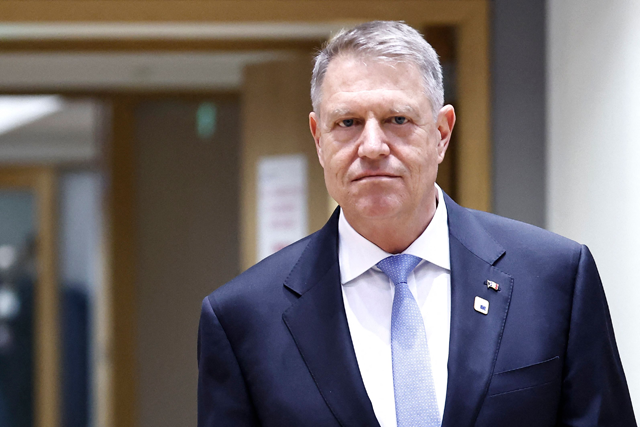You are here
Romanian PM Ponta quits after street protests
By Reuters - Nov 04,2015 - Last updated at Nov 04,2015
BUCHAREST — Romanian Prime Minister Victor Ponta quit on Wednesday, in a surprise move that will probably produce a new Cabinet led by a technocrat, after street protesters demanded resignations over a deadly fire in a Bucharest nightclub over the weekend.
Ponta is the country's only sitting premier to face a trial for corruption, and he was already under pressure to quit from the political opposition and President Klaus Iohannis, who defeated him in last November's presidential election.
Iohannis will consult political parties separately over the new premier starting Thursday and a possible nomination might emerge in the next days, he said.
"Last night, Romanians' outrage became true revolt," Iohannis said. "We can't believe that just a government change will solve Romania's problems. There is more to be done."
Ponta's departure might lead to a political realignment, although the coalition of three mainly leftist parties that form a majority in parliament showed no signs of a split. New elections are not due until December 2016.
After an emergency coalition meeting, their leader, Liviu Dragnea, said the priority was "to preserve stability" of the country. The next prime minister may not come from the party's ranks, Dragnea said.
"It would be very hard to propose and support a political person as prime minister anymore,” he said.
Iohannis, the former leader of the opposition Liberals, has said his aim is to bring his party to power. The constitution allows him to nominate a new premier, who then needs to win a vote of confidence in parliament.
Early elections appear unlikely, but still possible. They would be held only if parliament failed to approve two prime ministerial nominations by the president in votes of confidence within 60 days of the first nomination. No such snap poll has been held since the 1989 fall of communism.
Ponta stepped down to take responsibility for a fire in a nightclub on Friday night that had claimed the lives of 32 people by Tuesday and set off protests nationwide.
"I can carry any political battles, but I can't fight with the people," Ponta told reporters.
Angry about the way authorities grant permits and inspect public venues, protesters poured into the streets late into Tuesday night, carrying banners saying "Corruption Kills" and chanting "Murderers!" In Bucharest, about 25,000 people marched to government headquarters and the interior ministry on Tuesday.
"Victor Ponta is giving up his mandate," Dragnea told reporters in parliament. "Someone needs to assume responsibility for what has happened. This a serious matter and we promise a quick resolution of the situation."
Ponta had ignored all calls to step down after being indicted in September for forgery, money laundering and serving as an accessory to tax evasion during his time as a lawyer. He is likely to face his first court hearings later in November.
Defence Minister Mircea Dusa will take over as an interim leader to handle administrative work until a new government is voted in parliament.
The junior coalition party UNPR under Deputy Prime Minister Gabriel Oprea said in a statement on Wednesday that it was willing to keep supporting the coalition government.
"We back our coalition further and are available to create a new government majority alongside the PSD [Ponta's Social Democrat Party]," it said in the statement.
The UNPR's support ensures a parliamentary majority for the coalition government.
"We now think there will be a minority PSD Cabinet, potentially headed by a technocrat," said Otilia Dhand, an analyst at Teneo Intelligence, a New York-based political risk consultancy. "But I would only give that about a 40 per cent [probability] now. Thirty per cent for a Liberal minority Cabinet, and 30 per cent for early elections."
ING Romania's chief economist, Ciprian Dascalu, said: "To me, the most likely scenario seems a caretaker government until the general election, supported by a wide majority."
At 1530 GMT the leu had softened by 0.3 per cent on the day to 4.4455 against the euro, its lowest level since August 24, and debt yields rose by up to 10 basis points.
Related Articles
BUCHAREST — Former EU agriculture commissioner Dacian Ciolos was on Tuesday appointed Romania's new prime minister, following last week's re
BUCHAREST — Romanian President Klaus Iohannis announced his resignation on Monday after a procedure to impeach him was launched and as anger
BUCHAREST — Romania's pro-European government collapsed in a parliamentary no-confidence vote on Wednesday after only three months in office

















